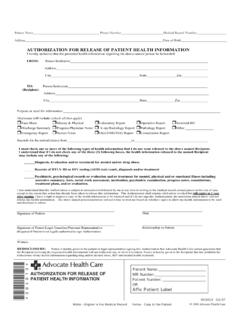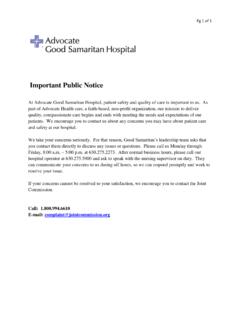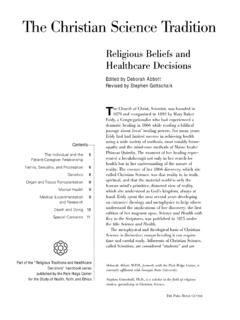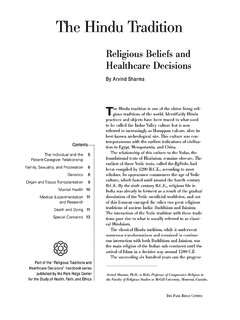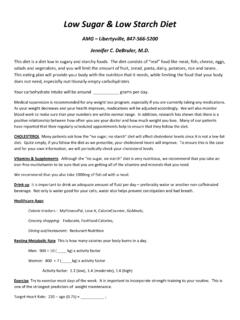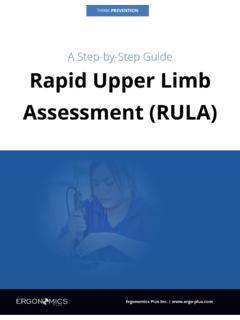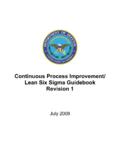Transcription of GUIDELINES FOR HEALTH CARE PROVIDERS INTERACTING …
1 JEHOVAH'S WITNESSES. MCHC 222 South Riverside Plaza CPWR 70 East Lake Street, Suite 205. Metropolitan Chicago Chicago, Illinois 60606-6010 Council for a Parliament of the Chicago, Illinois 60601. Healthcare Council Telephone (312) 906-6000 Worlds Religions Telephone (312) 629-2990. Facsimile (312) 803-0661 Facsimile (312) 629-2291. TDD (312) 906-6185. GUIDELINES FOR HEALTH CARE PROVIDERS INTERACTING WITH. JEHOVAH'S WITNESSES AND THEIR FAMILIES. BACKGROUND & INTRODUCTION. HEALTH care PROVIDERS need to have an understanding of and appreciation for the beliefs and religious preferences of their patients who are Jehovah's Witnesses in order to provide optimal care for them. Nationwide, there are approximately 1 million Jehovah's Witnesses with 50,000. residing in the metropolitan Chicago area. RELIGIOUS BELIEFS. Jehovah's Witnesses believe in Almighty God, Jehovah, the Creator of the heavens and earth.
2 They believe that the very existence of the intricately designed wonders in the universe surrounding us reasonably argues that a supremely intelligent and powerful Creator produced it all. They also believe that Jehovah God had a purpose in his creations. Their beliefs are based on the Bible and not on mere human speculations or religious creeds. They consider the Bible's 66 books to be inspired and historically accurate. They interpret the Bible literally except where the expressions or settings obviously indicate that they are figurative or symbolic. They understand that many of the prophecies of the Bible have been fulfilled, others are in the course of fulfillment and other still await fulfillment. They believe that the earth will remain forever and that all persons, living and dead, who will fit in with Jehovah's purpose for a beautified, inhabited earth will live on it forever.
3 BAPTISM. After learning what is involved through intense Bible Study and reasoning carefully on the matter, Jehovah's Witnesses willingly and joyfully dedicate their life to Jehovah making this dedication known publicly by a full immersion water baptism. CULTURE AND CELEBRATIONS. Jehovah's Witnesses do not participate in nationalistic ceremonies, such as saluting the flag. They also do not celebrate traditional Christian holy days, such as Christmas, or birthdays. BELIEFS RELATED TO HEALTH CARE. Jehovah's Witnesses accept medial and surgical treatment. They do not adhere to so-called faith healing and are not opposed to the practice of medicine. They are deeply religious and believe that blood transfusions are forbidden for them by such Biblical passages such as: Only flesh with its soul its blood you must not eat (Genesis 9:3-4); [You must] pour its blood out -CG-Jehovah's GUIDELINES -Jehovah's Witnesses/2.
4 And cover it with dust (Leviticus 17:13-14); and Abstain from .fornication and what is strangled and from blood (Acts 15:19-21). They believe that taking blood into the body through the mouth or veins violates God's laws. Witnesses view the above verses as ruling out transfusion with whole blood, packed red blood cells (RBCs), and plasma, as well as white blood cell (WBCs) and platelet administration. However, Witnesses' religious understanding does not absolutely prohibit the use of fractions such as albumin, immune globulins and hemophiliac preparations; each witness must decide individually if he or she can accept these. Autotransfusion is acceptable to many of Jehovah's Witnesses (as a matter of conscience). when the equipment is arranged in a circuit that is continuously linked to the patient's circulatory system and there is no storage of the patient's blood.
5 Witnesses do not accept preoperative collection, storage, and later reinfusion of their own blood. GENERAL BELIEFS AND PRACTICES (INDIVIDUAL PRACTICES MAY VARY). Jehovah's Witnesses beliefs are as follows: Abortion: Deliberately induced abortion simply to avoid the birth of an unwanted child is the willful taking of a human life and hence unacceptable. If (at the time of childbirth) a choice must be made between the life of the mother and that of the child, it is up to the individuals concerned to make that decision. Advance Directives: Jehovah's Witnesses carry on their person, an Advance Medical Directive/Release that directs no blood transfusions be given under any circumstances, while releasing physicians and hospitals of responsibility for any damages that might be caused by refusal of blood. (See the section on End of Life Care.)
6 Autopsies: Unless there is a compelling reason, such as when an autopsy is required by law, Jehovah's Witnesses generally prefer that the body not be subjected to postmortem dissection. The appropriate family member can decide if a limited autopsy is advisable to determine the cause of death. Burial of a Fetus: The decision is a personal one to be made by the couple or woman involved. Circumcision: For an infant, this is a personal matter for the parents to decide. Hemodialysis: Hemodialysis is a matter for each Witness patient to decide conscientiously if a closed circuit is employed, if no blood prime is used, and if there is no blood storage. Immunoglobulins, Vaccines: The religious understanding of Jehovah's Witnesses does not absolutely prohibit the use of minor blood fractions such as albumin, immune globulins and hemophiliac preparations.
7 Each Witness must decide individually whether he or she can accept these. Accepting vaccines from a nonblood source is a medical decision to be made by each individual. Open Heart Surgery: Some Witnesses will accept the use of a heart-lung machine when the pump is primed with nonblood fluids and if blood is not stored in the process. Organ Donation and Transplantation: While Witnesses believe the Bible specifically forbids consuming blood, they believe there is no Biblical command that pointedly forbids the taking j:\capes\ethics\cg-jehovah's witnesses GUIDELINES -Jehovah's Witnesses/3. in of tissue or bone from another human. Whether to accept an organ transplant is a personal decision. The same is true for organ donation. Serums: Serums are not forbidden; however, an individual Witness may still conscientiously refuse them. The same applies to minor blood fractions.
8 Use of Alcohol, Narcotics and Medications: Jehovah's Witnesses believe that moderate use of wine and other alcoholic beverages is not condemned by the Bible, but drunkenness is. Similarly, Bible principles of moderation and respect for one's life and mental faculties would rule out taking drugs for highs and thrills or to produce a form of drunkenness. Witnesses believe that the taking of mind-altering medications and drugs, including narcotics for severe pain, under the supervision of a physician, is a matter for personal decision, though they may not want to resort too quickly or without good cause to drugs that are addictive or hallucinatory if other effective methods of treatment were available or if endurance of temporary pain would be the preferable course. Volume Expanders, and some Drugs: Nonblood expanders, and some drugs (including dextran, hydroxyethyl starch, aprotinin, antifibrinolytics) are acceptable to Witness patients.
9 Bloodless Medicine and Surgery: Alternatives to blood transfusions may be requested by Witness patients. They may include: Use of fluids such as Ringer's lactate, dextran, hydroxyethyl starch and others to maintain blood volume, preventing hypovolemic shock. Drugs: Genetically engineered proteins can stimulate the production of red blood cells (erythropoietin), blood platelets (interleukin-11), and various white blood cells (GM-GSF, G-CSF) and other medications greatly reduce blood loss during surgery (aprotinin, antifibrinolytics) or help reduce acute bleeding (desmopressin). Biological hemostats: Collagen and cellulose woven pads that stop bleeding by direct application; fibrin glues and sealants can plug puncture wounds or cover large areas of bleeding tissue. Blood salvage: Blood lost during surgery or trauma is salvaged, cleansed and can be returned to the patient in a closed circuit.
10 Surgical tools: Devices that cut and seal blood vessels simultaneously or devices seal bleeding on large areas of tissue. Laparoscopic and minimally invasive instruments that enable surgeries to be performed without the blood loss associated with large incisions. MEDICAL & NURSING CARE. The patient (or parents/guardians of young children) should be fully informed on diagnosis, prognosis and treatment recommendations so that informed HEALTH care decisions can be made. Parents have the legal right to make such decisions for their unemancipated children. In rare emergent situations where doctors believe it is necessary to obtain a court order to impose medical care for which the parents have not given consent (such as administering a blood transfusion), the parents should be informed of such intended action as early as possible so that they may also be represented in court.

